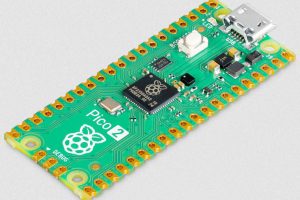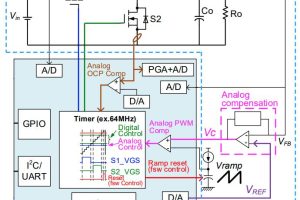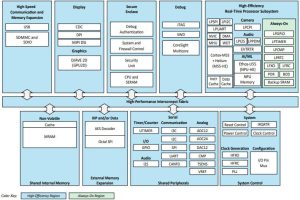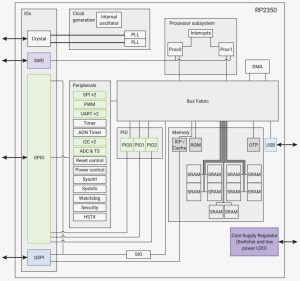
- RP2350A QFN60 no flash $0.80
- RP2350B QFN80 no flash $0.90
- RP2354A QFN60 2Mbyte flash $1.00
- RP2354B QFN80 2Mbyte flash $1.10
QFN60 types are 7 x 7mm and have 30 GPIOs, QFN80 types are 10 x 10mm and have 48 GPIOs.
Flash is added by stacking a QSPI die inside the package – and the prices above are for reels of 3,400.
The MCU, announced yesterday, has two cores operating at any one time, which can be mixed and matched from a on-die stable of two Arm Cortex-M33 cores and two Hazard3 RV32I RISC-V cores.
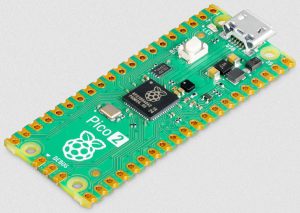 Also scheduled to be available before the end of the year, is a wireless version of the Raspberry Pi Pico 2, the 21 x 51mm board (left) on which RP2350 is first available.
Also scheduled to be available before the end of the year, is a wireless version of the Raspberry Pi Pico 2, the 21 x 51mm board (left) on which RP2350 is first available.
“We expect to ship a wireless-enabled Pico 2 W, using the same Infineon 43439 modem as Pico W, and versions of both Pico 2 and Pico 2 W with pre-installed 0.1inch headers,” according to the company.
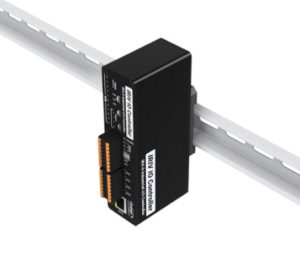 Cytron has already adopted RP2350 for its industrial IRIV IO controller
Cytron has already adopted RP2350 for its industrial IRIV IO controller
Bounty on its head
Unlike the earlier RP2040, RP2350 includes security on several levels, and, in view of vulnerabilities found for some other protected MCUs, the company is offering $10,000 to the first person to hack its secured boot.
“This will run for a month in the first instance. We may extend the window if no flaw is found, or offer further bounties for further distinct flaws,” it said. “We fully expect to find, and fix, flaws in our boot process. And we want to find these flaws early, before RP2350 is deployed in critical applications.”
Moves are afoot, with the Trusted Firmware project, to establish RP2350 as reference hardware for Trusted Firmware-M 2.1.0 Long Term Support as a route to PSA Level 2 certification.
Rust
For software development, an updated release of the Pico SDK is available for the new parts, as are MicroPython and CircuitPython images.
C/C++ development is through an update to Raspberry Pi Pico Visual Studio Code.
And a port of the Rust language is planned: “Jonathan Pallant and his co-conspirators have been working to bring the Rust language to our new platform,” said Raspberry Pi CEO Eben Upton.
Aside from Pico 2, RP2350 development hardware has been announced by companies including Pimoroni, Adafruit, Sparkfun, Ignys and Invector Labs.
Find the RP2350 product page here, the hacking challenge on GitHub here and the Cytron IRIV industrial controller here
 Electronics Weekly Electronics Design & Components Tech News
Electronics Weekly Electronics Design & Components Tech News
